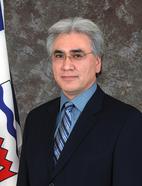Thank you, Mr. Chairman. I am pleased to give the report of the Standing Committee on Social Programs on the review of the business plan and budget of the Department of Education, Culture and Employment.
The standing committee recognized that implementing all of the department's proposed reductions in a single year would have a significant impact on the education system. Members also acknowledge the complications that arise from the difference between the government's fiscal year and the education boards' and colleges' financial year. However, Members are concerned that next year there may be additional reductions necessary. Spreading cuts over an extended period may mean reductions on top of prior year reductions. While the standing committee supports Investing in People to reduce their dependence on social assistance, Members believe that investment must be within the limitations of our financial situation.
At this time, the standing committee reluctantly accepts the department's three-year phase-in plan for the reductions to schools, colleges and income reform. However, the standing committee expects the Minister to be aggressive in encouraging changes which may allow the 1997-98 business plans and budgets to reflect a shorter implementation period for these reductions.
The standing committee agrees with the Minister that we need a new and more innovative approach to income reform. As program reductions are made, there must be corresponding changes which open the boundaries of the
program and blend with other resources at the community level. There seems to be many pools of funding which should be brought together, so they can be used more effectively in the community. The standing committee asked the Minister to consider a variety of options under income reform including work for pay to provide much needed services in the community. The standing committee is not proposing regular 9:00 to 5:00 work, but suggests people could assist with jobs that need to be done such as assisting elders or helping with snow removal.
The standing committee Members believe strongly that people need the opportunity to contribute to their community and have pride in work done, rather than just receiving a handout from the government. There also needs to be consideration for creating an income support system which encourages individuals to try to earn as much of their own way as possible, rather than penalizing people. The standing committee also believes that income reform should include a review of those other programs which impacts on its effectiveness. In particular, the standing committee is concerned about the relationship between income support and the rent scale for social housing. The Minister has committed to bringing forward a potential model for income reform to the standing committee by June 1, 1996. The standing committee looks forward to reviewing the model.
The standing committee feels the student services process needs to be improved and service provided closer to the community level where possible. There should also be closer contact with social assistance to ensure people are receiving support from the appropriate program. The department is currently reviewing the student financial assistance program. The standing committee looks forward to the results of this review.
The standing committee believes that offering the first two years of an education degree through the teacher education program has been very valuable. However, it is often difficult for those mature students who have completed the two-year program to leave the North to complete their degrees. The standing committee encourages the government to offer the third year of a bachelor of education and begin work to offer the fourth year as well.
The department is currently reviewing how it provides language services. The standing committee has concerns in the way services are provided by the language bureau and looks forward to reviewing the results of this review.
The standing committee thinks schools and education boards should determine for themselves how to meet the budget targets. The standing committee requested that the department provide general guidelines to the boards which would include suggestions to:
- reduce administration before programs; pursue other avenues for reducing costs by combining resources with other boards in the region; and,
- exhaust all other possible areas for reductions before cuts are considered in the formula areas, territorial schools, inclusive schooling, aboriginal languages and cultural programs.
With fewer dollars and an ever-increasing number of students, space in schools will continue to be a concern for the government. In the past, the department reviewed the need for classroom space on a school-by-school basis. However, in order to make more efficient use of our limited resources, the department is now approaching the need for space from a community-wide perspective. The standing committee is very supportive of this approach. If a community has one school which is underutilized and another which is overutilized, the standing committee agrees that better ways of sharing the space available should be the solution rather than new schools.
The standing committee reviewed the new initiatives the department proposed. Members believe that these initiatives are examples of the philosophy of investing now for greater rewards and possible savings later. The standing committee supports the philosophy and, therefore, supports the proposed new initiatives.
One of the new initiatives -- alternative government structures -- caused the standing committee some concern. When the standing committee recommended that boards and departments need to explore options for combined administrations and other efficiencies at the community and regional level, it was assumed that this would be driven from the local level. In discussing the initiative, the department indicated that they were going to phase this in and try to develop a model which might work. The standing committee believes that solutions may be different in every region. Members would like to see the initiative take place in one year rather than spread over two or more years.
Mr. Chairman, that concludes the report of the Standing Committee on Social Programs on this department.
